Religious Exclusivism and Pluralism as a Political Project
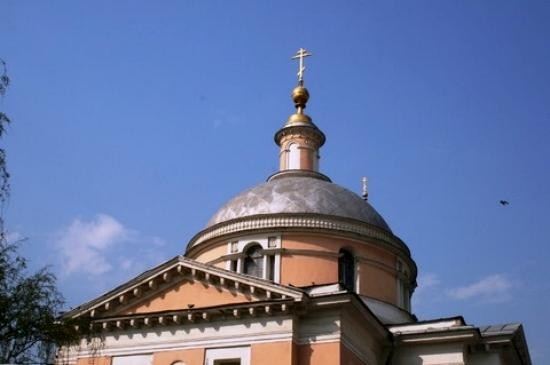
The 11th Annual Prophetic Voices Lecture
Miroslav Volf
Yale Divinity School
Date: March 14, 2012
Abstract
Increasingly people of diverse religious backgrounds live together under the same political roof. At the same time, many people embrace politically assertive and religiously exclusivist religions. One of the central questions of today is whether and to what extent it is possible for religious exclusivists to embrace pluralism as a political project.
Speaker Bio
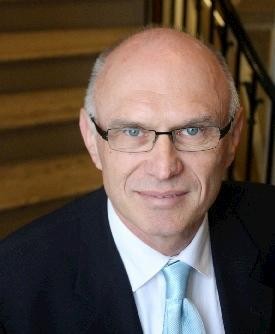
Miroslav Volf is the Henry B. Wright Professor of Systematic Theology at Yale Divinity School, and the founding Director of the Yale Center for Faith and Culture. His books include A Public Faith: How Followers of Christ Should Serve the Common Good (2011); Allah: A Christian Response (2011); Free of Charge: Giving and Forgiving in a Culture Stripped of Grace (2006); Exclusion and Embrace: A Theological Exploration of Identity, Otherness, and Reconciliation (1996); and After Our Likeness: The Church as the Image of the Trinity (1998). He has been involved in international ecumenical dialogues (for instance, with the Vatican’s Pontifical Council for Promoting Christian Unity) and interfaith dialogues (on the executive board of C-1 World Dialogue), and is an active participant in the Global Agenda Council on Values of the World Economic Forum. A native of Croatia, he regularly teaches and lectures in Central and Eastern Europe, Asia, and across North America. Volf earned a B.A. at Evangelical-Theological Faculty, an M.A. at Fuller Theological Seminary, and a Ph.D. at University of Tübingen.
Event Photos
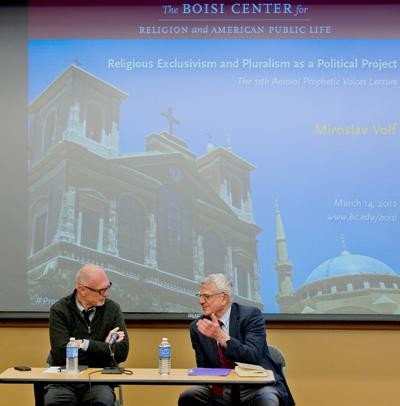
Miroslav Volf, Yale Divinity School, and Alan Wolfe, Boston College on March 14, 2012 during the 11th Annual Prophetic Voices lecture.
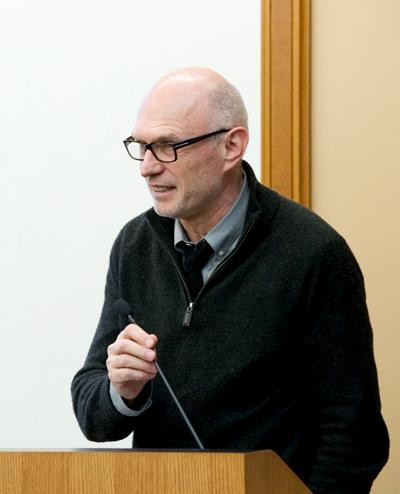
Miroslav Volf, Yale Divinity School, on religious exclusivism and pluralism as a political project on March 14, 2012.
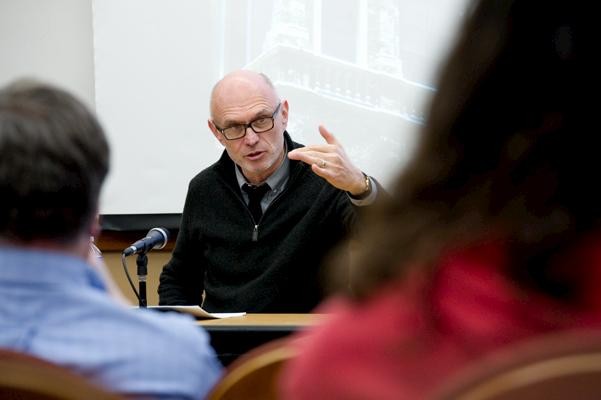
Miroslav Volf speaking on March 14, 2012.
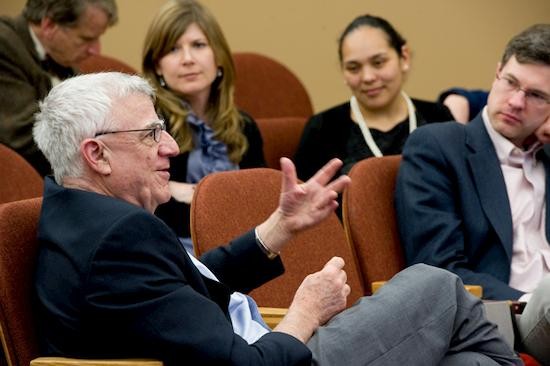
Alan Wolfe during the question and answer session on March 14, 2012.
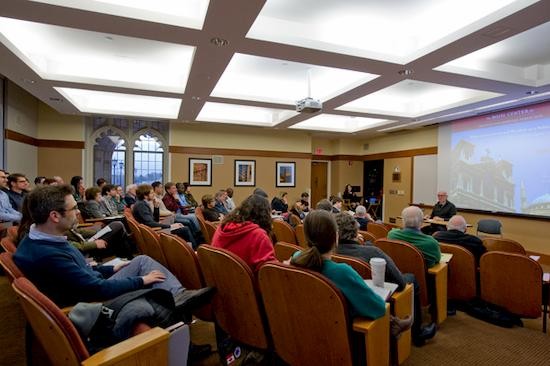
The audience in Devlin 101 on March 14, 2012.
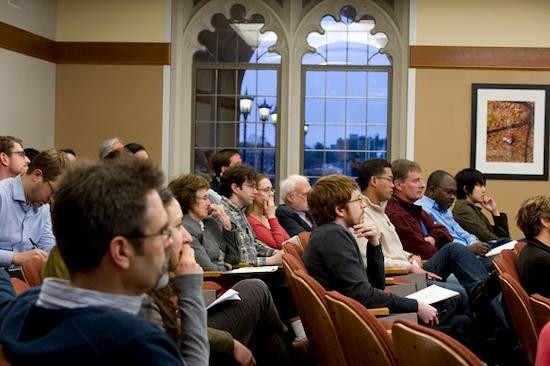
The audience in Devlin 101 on March 14, 2012.
Event Recap
Miroslav Volf, the Henry B. Wright Professor of Systemic Theology at Yale Divinity School and founding director of Yale Center for Faith and Culture, delivered the Boisi Center’s 11th annual Prophetic Voices Lecture on March 14 to an eager audience on the topic of “Religious Exclusivism and Pluralism as a Political Project.”
Political pluralism, Volf argued, exists when institutions protect the political rights of all people, regardless of their beliefs. Its converse is political exclusivism, in which an overarching vision of life (such as Saudi Wahhabi Islam or Soviet communism) is enshrined in political institutions and used to punish or repress those who do not share it. Religious pluralism is the theological claim that many religions can provide access to the divine along with effective avenues for human flourishing. It is opposed to religious exclusivism, whose adherents Volf described in three categories: “strong truth exclusivists” who view their faith as the only true faith; “weak truth exclusivists” who believe that their faith merely contains a more complete truth than others; and “salvation exclusivists” who believe that their faith alone can provide human flourishing and save souls.
Today, Volf said, religious faiths are primarily exclusivist and often politically assertive—and despite predictions to the contrary, they are growing. At the same time, globalization encourages interdependence and homogeneity, spreads democratic ideals and gathers those of diverse faiths under the same political roof. A crucial challenge for societies around the world, then, is how to manage the convergence of religious exclusivism and calls for political pluralism. Volf emphasized that religious exclusivism is not necessarily tied to political exclusivism, and called for a decoupling of the two concepts. He argued that religious exclusivists can (and indeed many do) embrace political pluralism, citing examples across time and traditions from seventeenth-century Baptists to twentieth century Sufis.
During the robust question and answer session following his lecture, Volf defended his argument that truth claims inherent in religious faiths are not at odds with political pluralism. While religions often profess superiority, he suggested that most still admit their imperfection in the interpretation of the divine. When asked whether religion is the only means to human flourishing, Volf clarified that there are robust secular as well as religious visions of common good, citing the philosophers Nietzsche, Marx and Kant.
Earlier, Professor Volf had conducted a seminar at the Boisi Center for graduate students and faculty in which he discussed contemporary conflicts between religion and pluralism in Europe, the Middle East and North Africa. He also discussed the book he is writing with former British Prime Minister Tony Blair on faith and globalization, based on a course they jointly taught at Yale.
Read More
Further Reading
Books
Volf, Miroslav. A Public Faith: How Followers of Christ Should Serve the Common Good. (Brazos Press, 2011). Volf discusses the role of Christianity in public life.
Volf, Miroslav. Allah: A Christian Response. (HarperOne, 2011). Volf discusses points of converngence in Christianity and Islam, arguing that believers of both religions worship the same God.
Volf, Miroslav. Exclusion and Embrace: A Theological Exploration of Identity, Otherness, and Reconciliation. (Abingdon, 1996). Appealing to old testament metaphor of salvation as reconciliation, Volf proposes the idea of embrace as a theological response to the problem of exclusion.
Volf, Miroslav. A Voice of One’s Own: Public Faith in a Pluralistic World. (Yale University Press, 2005).
Moltmann, Jurgen. Is “Pluralistic Theology” Useful for the Dialogue of World Religions? in Christian Uniqueness Reconsidered. (Orbis Books, 1990).
Beneke, Chris. Beyond Toleration: The Religious Origins of American Pluralism. (Oxford University Press, 2006). Beneke demonstrates how the United States managed to overcome the religious violence and bigotry that characterized much of early modern Europe and America by accommodating religious differences.
Eck, Diane. A New Religious America: How a “Christian Country” Has Become the World’s Most Religiously Diverse Nation. (Harper, 2001). Eck explores why understanding America's religious landscape is the most important challenge facing us today.
Monecal, Maria Rosa. The Ornament of the World: How Muslims, Jews, and Christians Created a Culture of Tolerance in Medieval Spain. (Little, Brown, and Company, 2002). Monecal illuminates the culture of medieval Spain where, for more than seven centuries, Muslims, Jews, and Christians lived together in harmony.
Articles
Miroslav Volf's article in the Christian Century, "Allah and the Trinity."
Miroslav Volf in the Huffington Post, "Do Christians and Muslims Worship the Same God?"
Ray Waddle in Notes from the Quad, "Biblical God and Allah are one, says Miroslav Volf."
Videos
Miroslav Volf lectures at Yale University on Multiple Faiths, Common World.
Miroslav Volf lectures at Yale University on the Role of Faiths in Pluralistic Democracies.
Miroslav Volf speaks at Wheaton College on Allah: A Christian Response.
In the News
Should religious rules should end at the church door? Tensions similar to those in the United States are also erupting in England, where many Catholic adoption agencies have shut down in the wake of new judicial rulings that would have required them to accept homosexual couples as parents.

